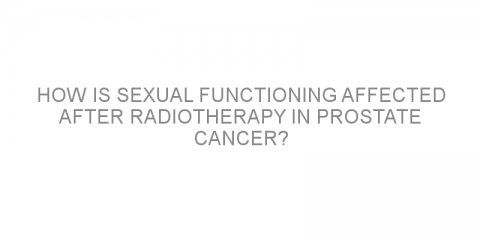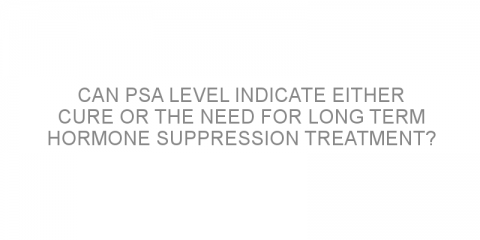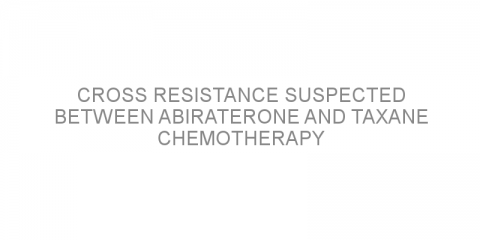In a nutshell The authors aimed to determine the effects of sildenafil citrate in improving sexual function after radiotherapy. Some background Radiotherapy is the use of high-energy rays to target and cure cancer with minimal damage to normal cells and is a common treatment option in prostate cancer. It can be given from outside the body or from...
Read MoreTreatment(s) already received-Hormonal therapy Posts on Medivizor
Can PSA level indicate either cure or the need for long term hormone suppression treatment?
In a nutshell This study investigated if measuring the levels of prostate specific antigen (PSA) after cancer therapy could indicate a cure or if the patient should be considered for long term androgen deprivation (suppression) therapy. The main finding was that lower PSA blood levels predict better survival in patients with prostate cancer. Some...
Read MoreDenosumab; reduces skeletal complications in metastatic castration-resistant prostate cancer
In a nutshell The authors evaluated skeletal events to determine whether denosumab (Prolia) reduced the risk of skeletal complications in metastatic castration-resistant prostate cancer. Some background Denosumab is a drug used to treat metastatic castration-resistant prostate cancer (cancer which has spread from the prostate and...
Read MoreFibrinogen – a new predictor in prostate cancer
In a nutshell The authors evaluated whether fibrinogen could be used to determine cancer survival in prostate cancer. Some background Fibrinogen is a very important protein that clots blood inside the body. It has previously been used to determine the metastatic potential (likelihood that the cancer cells will spread) of lung cancers and...
Read MoreMeasuring PSA level between treatments can predict likelihood of recurrence
In a nutshell This paper investigates measurement of the levels of the protein prostate-specific-antigen (PSA) as a predictor of cancer returning when the patient is treated with neoadjuvant androgen deprivation therapy and radiotherapy. Some background Prostate cancer patients have been shown to have higher rates of biochemical relapse-free...
Read MoreWhen hormone therapy fails, what happens next?
In a nutshell This analysis compared previous research to determine the most effective treatment for hormone receptor positive breast cancer patients whose disease has progressed despite initial treatment. Some background Hormone receptor positive breast cancer depends on the hormones estrogen or progesterone for growth. The principle...
Read MoreOverall survival with fulvestrant 500mg versus 250mg
In a nutshell This study examined overall survival rates following treatment with different dosages of fulvestrant (Faslodex) in patients with recurrent or metastatic estrogen receptor-positive breast cancer. Some background Estrogen receptor-positive (ER+) breast cancers are dependent on the hormone estrogen for continued growth and spread....
Read MoreA new hormonal therapy for castration resistant prostate cancer
In a nutshell This early phase study assessed the efficacy and safety of a new drug, Orteronel (TAK-700), in patients with castration-resistant prostate cancer. Some background Androgen deprivation therapy (ADT), or castration therapy, is the standard of care for advanced prostate cancer. ADT usually involves either surgical...
Read MoreCross resistance suspected between abiraterone and taxane chemotherapy
In a nutshell This study evaluated the effectiveness of taxane-based chemotherapy after treatment with abiraterone (Zytiga), to determine whether resistance to androgen blockade also affects the outcome of taxane treatment. Some background Castration-resistant prostate cancer refers to cancer that has progressed despite androgen deprivation...
Read MoreThe Gleason score can predict which prostate cancer patients can benefit the most from docetaxel therapy
In a nutshell This study re-examines data from a previous study and aims to identify which patients with prostate cancer would benefit the most from docetaxel (Taxotere) therapy. Some background Prostate cancer grows in response to testosterone, the main male sex hormone. In order to reduce the effect of testosterone, castration is the mainstay of...
Read MoreDoes obesity influence how breast cancer patients will benefit from further hormonal therapy?
In a nutshell This article investigated whether the body mass index or BMI (defined as weight divided by the square of height) can be used to determine how a patient with breast cancer treated with hormonal therapy may benefit from further treatment with a type of hormonal therapy called aromatase inhibitors. Some background Aromatase inhibitors...
Read MoreCan removal of the axillary lymph nodes be avoided if there is minimal involvement of the sentinel lymph nodes in breast cancer?
In a nutshell This study tested the effect of complete axillary lymph node removal, on survival without recurrence of the cancer (called disease free survival or DFS) in patients with breast cancer. Some background Lymph nodes are small organs which are part of the immune system. They filter fluid called lymph. Lymph can be thought of as the...
Read More













